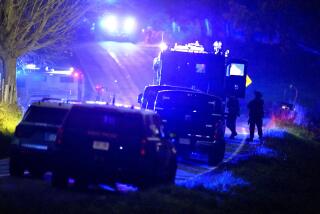A killing without closure for family of farmer, 82
- Share via
MARION, N.D. — Part of Norman Limesand’s job as a township officer was to manage culverts in the county, to make sure they were clear of obstructions so roads wouldn’t flood. He’d been doing this work for more than 30 years.
Two weeks before Thanksgiving 1999 on a narrow farm road he’d traveled hundreds of times, Limesand was shot and killed. His family believes a clogged culvert on a neighbor’s farm set in motion the tragic events.
The neighbor who admitted killing him is in prison, but Limesand’s body was never found.
More than seven years after the shooting, what happened on that road in a small southeastern North Dakota farming community remains a mystery.
“There has been no closure,” said Marjorie Limesand, Limesand’s wife of 52 years and mother of their eight children.
The road leading to where the farmer was killed is rarely traveled these days, except by his son, who still must use it to tend cows and crops.
The neighboring farmhouse, owned by the mother of Limesand’s killer, is abandoned and boarded up. Ditches along the disputed culvert are overgrown with cattails and weeds in thick ice.
Steve Thomas, a 41-year-old former Marine and ex-con with a drug problem, pleaded guilty to manslaughter and recently was sentenced to 10 years in prison for killing his neighbor.
It was an accident, he said. He was hunting rabbits on his mother’s property when his dog flushed a pheasant. He said he didn’t know Limesand was in the area and accidentally shot him in the face.
As part of the plea agreement, Thomas said he would help officials find the body. But despite hypnosis and a lie detector test, he said he could not remember where he dumped it.
“We’re willing to settle for a bone fragment or a tooth,” Wes Limesand said of his father. “It would be more than just a memory of what we have now.”
Thomas was a suspect early on. He was convicted in California in January 1995 on a charge of assault with a deadly weapon “with great bodily injury,” serving a year in prison.
After his probation ended in California, Thomas moved in with his mother in 1999. He had hoped to return to the community where he grew up to start a new life.
“You got a start, but not the start you were looking for,” Southeast District Judge James Bekken said as he handed down the sentence.
Limesand’s family believes it was a cold-blooded killing.
“I wish I could put into words how this crime affected me and my family,” Marjorie Limesand said.
Norman, 82, who had farmed in the Marion area since 1947, was a township officer and took the job seriously.
The farm owned by Bonnie Rosland, Thomas’ mother, had a problem with a clogged culvert.
Milton Limesand, who farms near his parents’ home, said he and his father visited Thomas the day before Limesand disappeared on Nov. 12, 1999. They offered to help Thomas clean out the culvert but Thomas declined. The next day, Limesand was gone.
“The last thing he said to me was, ‘I’m going to check the cattle,’ ” his wife said. She and her family believe Limesand also paid a visit to Thomas.
“He evidently went over to see how things were going there,” Milton Limesand said.
Marjorie Limesand told Bekken the killing was an “insane, senseless act on a defenseless 82-year-old man.”
“It wasn’t reckless discharge of a firearm,” she said. “It was murder, pure and simple.”
Thomas said he put the body in Limesand’s pickup and drove around before dumping it in a dry slough. The truck was found four days later on a street in Moorhead, Minn., a border city about 65 miles east of Marion and on the outskirts of Fargo.
Authorities found blood on the pickup and tests showed it belonged to Limesand. He was declared dead in 2002.
LaMoure County prosecutor Kim Rademacher said Limesand’s blood and a lens from his eyeglasses were found near the culvert, across from the Rosland farmhouse.
Thomas had burned the area the day after Limesand disappeared, the family said.
Rademacher said Thomas’ story about the accidental shooting was not plausible. But there was never enough evidence against him to charge him with Class AA murder, which carries a life sentence.
“Our biggest hurdle is that we didn’t have any direct evidence linking Mr. Thomas to the case,” she said.
Assistant Atty. Gen. Jon Byers said the case was made even more difficult because no body was found.
The Limesands believe Thomas is not being truthful about where he hid the body.
“The only one who benefited from the plea agreement is the defendant,” Marjorie Limesand said.
Thomas’ court-appointed lawyer, Don Krassin, said the best his client could do was narrow the area where he dumped the body to about 80 square miles.
Bekken ordered Thomas to cooperate in any future searches. But prosecutors and Krassin believe the chances of finding the remains are slim.
“I would be very shocked if he will have any more recall,” Krassin said. “I think he has tried, and tried his best, and it has not led to the result that we had hoped.”
For the Limesand family, who were hoping to have something to bury, it is not enough.
They’ve placed a grave marker for Limesand at a Marion cemetery.
More to Read
Sign up for Essential California
The most important California stories and recommendations in your inbox every morning.
You may occasionally receive promotional content from the Los Angeles Times.













